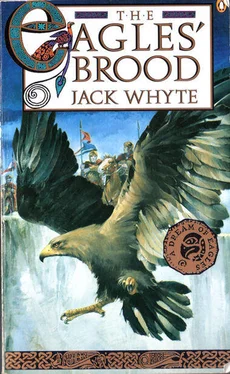"That is obscene."
"No it's not, Luke. It's different, I'll grant you, but there's nothing unnatural about it when you consider the man and his life." I stopped and sniffed, scenting my own hypocrisy. "Mind you," I went on, "I must admit I thought as you did, at first—until I'd had time to adjust to the reality of the situation." I told him then what Germanus had said to me. Lucanus looked around him at the scattered Saxon corpses and sighed.
"Do warrior bishops drink good wine?"
I laughed. "I have no idea, but I hope so. Let's find out."
We followed our men down to the ruined farm.
Our original estimate from the top of the ridge had been quite accurate. There were twenty-eight men in Germanus's retinue, and of those, fourteen were clerics of varying description. Four of them, I discovered later, were bishops like Germanus, from Gaul and Italia. They were a strangely featureless group, these clerics, ranging in age from the late teens to the mid-forties, I guessed, all of them distinguished by their lack of individual distinctiveness. They were dressed alike, for the most part, in long, plain robes of brown, black or grey homespun cloth, and while several of them wore stout leather belts to waist their robes, there were others who wore a plain length of rope as a girdle, reminding me unpleasantly of the zealot priests who had invaded Camulod. I would discover later from Germanus that these symbols of poverty were manifestations of a growing inclination towards austerity among some churchmen, a proclivity being fostered by the adherents of the Monasticism that was now becoming an increasingly prevalent influence among the religious community in Rome, having spread there from Greece and the Eastern Empire.
The remainder of the party, who had formed the wedge of cavalry that had rescued us, were very different, both in character and in appearance. These men were soldiers, with the uniform, bearing, and manner of soldiers, although the latter was restrained out of respect for the piety of the group they were escorting.
Their commander, a tribune called Marius Tribo, was a gregarious young man who treated his two young subalterns, the decurions Plato and Rufus, with strict yet tolerant authority and goodwill. Plato and Rufus, for their part, used a similar approach with their troopers, a nine-man squad who had obviously served together long enough to be the kind of close friends that only serving soldiers can be. Tribo told me, over a cup of excellent wine, that they had been stationed in Gaul for the past four years, campaigning against the Burgundians, who were threatening to take over the entire country. They had already done so, for all intents and purposes, he admitted. There was now no more than a corridor along the north-western coast where Roman forces could feel any degree of security. He, his two subalterns and nine men were all that remained of his original force of eighty—two complete cavalry squadrons. Replacements had stopped reaching them a year before, and they had been delighted when they were ordered to escort Bishop Germanus and his four episcopal companions to Britain to attend the debate in Verulamium. The rest of Germanus's party would assemble there. The lesser churchmen in the present group had joined them in Britain, on the road from the south coast.
As Lucanus and I stood talking with Tribo and his two decurions, Germanus himself approached the fireside where we stood and, taking me by the elbow, nodded pleasantly and made an excuse for taking me away. I followed him to another fire set apart, where no one was cooking and none could overhear us. He had removed his armour and now wore only his simple, white tunic and leggings.
He seated himself on a stool and waved me to another beside him. I sat down, feeling his eyes on me but not wishing to give offence by staring frankly back. It was a beautiful, warm day and I wondered about the fire. Every other fire in the camp was crowned with cooking stones, but this appeared to be built for heat alone.
"A cold land you have here, Caius Merlyn, even on a warm day." Germanus reached out his hands towards the flames. I looked at him in surprise and he smiled. "I am still unused to being far from the sun of Africa. My blood is thin. Even in Italia, which is far warmer than this, I am constantly beset with chills." He was gazing into the flames as he said this, and I looked at him openly now.
I guessed his age at between forty-five and fifty, and probably in the upper part of that range. His hair was dark, crisp and curly and shorn close to his scalp in the Roman military fashion. His skin was dark, deeply tanned by years of exposure to burning sunlight, and his deep-set brown eyes were creased around the outlines with wrinkles. It was a strong, good face, and the rest of the man was made to match it. His shoulders were broad and his chest deep, his arms strong and clean-muscled with no sign of advancing age. His legs, the right stretched out towards the fire, were solid and well-shaped. Altogether a formidable man, I thought, for a soldier, let alone a churchman.
He cleared his throat and spoke without looking at me. "Caius Merlyn Britannicus ...I served at one time with a man called Britannicus ...Picus Britannicus. Any relation?"
"He was my father, sir."
"Was he indeed?" Now he looked at me. "The golden hair should have told me so without my having to ask. I knew him well, once. He was my friend for many years, under Stilicho." He paused. "When did he die?"
"Some months ago."
"That recently? My condolences. He was a fine man and an inspired cavalryman."
"Thank you, sir. He thought well of you, too. When my great-aunt Luceiia heard your name, she recognized it instantly from my father's letters. It was she who told me who you were...are. She was sorry not to be able to come with us, but she is a very old lady now."
Germanus was looking at me thoughtfully, his upper lip caught between his teeth. I lapsed into silence, waiting for him to voice what was in his mind. He did not keep me waiting long.
"Caius? Merlyn? What do your friends call you?"
"Either," I told him, smiling. "But mostly Merlyn."
"Well, Merlyn then.. .an unusual name.. .Is it British?"
"Celtic, from Cambria. Merlyn is one of the Celtic gods."
"I see. Well, Merlyn, I came here to Britain to debate the theories of the Church in Rome and elsewhere with the British.. .adherents—I almost said disciples—of a man who stands condemned for apostasy, if not outright heresy."
I nodded. "I know. Pelagius."
"Yes, Pelagius. I'm surprised you know of him. How do you know of him?"
"My father knew him."
"Aah!" Germanus nodded, smiling to himself. "Why would I even ask? Of course your father would have known him. The man came from Britain and made a name for himself. Your father would have sought him out for that alone. Picus was fiercely proud of being from Britain." He paused, frowning now. "But that alters nothing. As I was saying, I came to debate the teachings of Pelagius—his beliefs, which have been proved heretical. But this debate is theological, bishop to bishop. It can have little significance—the form and content of the debate itself, I mean, not the outcome—for ordinary men. And none at all for women, I should think. So tell me, if you please, about this great-aunt of yours...Luceiia, you said? How would she have learned of this? And why would she wish to attend? And why," he drove on, "having decided she wanted to attend, would she not then do so, in spite of being hampered by her age? I should have thought that if her mind is clear enough to conceive of the issues involved, and her interest keen enough to discover the date and the place, then her age alone should not have deterred her."
I was nodding my head in agreement before he had finished speaking. "It didn't, but the distance did."
Читать дальше









